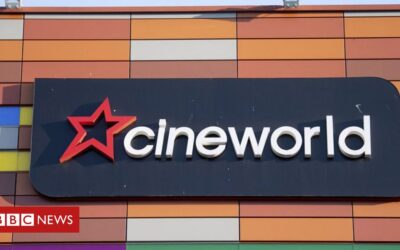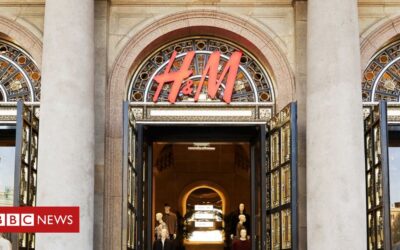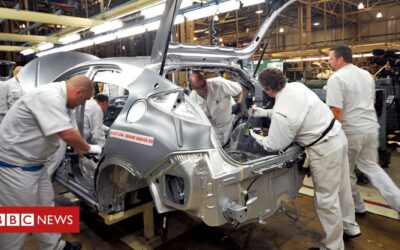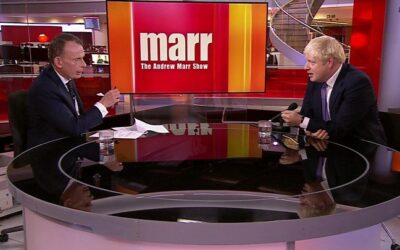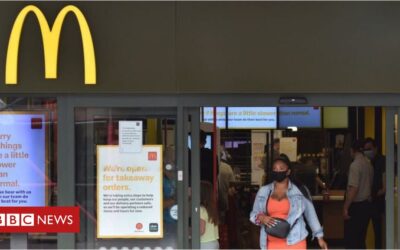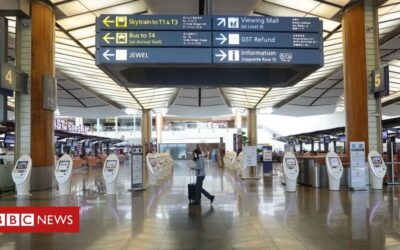Working at Cineworld “sometimes just doesn’t feel like work,” says an employee who’s just heard the cinema chain is temporarily shutting down.She hasn’t been told what will happen to her job but the company employs about 5,500 people in the UK.The worker, who wants to stay anonymous, is a manager at a Cineworld in the north of England.”Every single cinema I’ve worked at, it’s a family,” she says.Cineworld closure puts 5,500 jobs at riskThe worker says she heard the news “just like everybody else did – via the press.”It came as “a little bit of a shock, but not a surprise, because it has been been tough. “Since we reopened [in July] the numbers haven’t been what they were pre-pandemic.”Part of the excitement of coming to the cinema is to see something new… and there is nothing new.”Cinemas – along with other event spaces like theatres and live music venues – have had a tough time since lockdown.Cineworld made the announcement a few days after the new James Bond film, No Time To Die, was delayed again until next Easter.That film was expected to bring in a lot of customers.But the truth is cinemas were struggling even before that announcement.A number of big releases have been delayed, including Black Widow, Wonder Woman 1984 and Fast and Furious 9.And Disney released its $200m (£154m) blockbuster Mulan online instead of in theatres.Sci-fi epic Tenet is the biggest film to get a cinema release – which did give cinema workers hope.”When Tenet came out, it was fantastic. And a lot of people came to see that and are still coming to see that today,” says the Cineworld employee.”It did give me hope you know that this isn’t forever.”However, the film’s so far failed to make back its big budget – partly because of Covid restrictions in the US.Cineworld is not the only cinema to have made cuts. Odeon says about a quarter of its 120 cinemas will only be open on weekends because of a lack of customers.Odeon to open weekends-only at some cinemasIt could have knock-on effects for other businesses, too.Many cinemas attract customers who then go for food or drinks nearby afterwards.”We are part of a kind of entertainment facility, we have ten-pin bowling, a casino and multiple restaurants,” says the Cineworld worker.Hannah Aylett, 27, works in a cocktail bar next to Cineworld in Loughborough.”A fair bit of our weekday evening trade comes from people having a few cocktails and a bit of food, both before and after going to the cinema,” she tells Newsbeat.”It’s really hard to say at the moment, but it does make me nervous for the future of hospitality at the moment.”Why are cinemas so important?One person who knows the importance of having a healthy film industry is Steven Ryder from the educational film charity Into Film.Steven helps pick films which fit in with the curriculum to screen to schools. “Usually, we do focus on the big releases, but at the moment, there’s been less and less of those,” he says.He says his job shows him “just how powerful cinema is,” adding: “Cinema is, at its heart, a collective experience.”We get to sit in a room with people and experience a window to the world – or this dream – all at the same time.”That’s been missing during the pandemic – with packed-out cinema screenings on hold right now.But, Steven says, there’s still plenty on offer in cinemas. “The more we tell people in the media that it’s not worth going to the cinema until James Bond is out, the more we’re missing the point of what cinemas should be.”He’s been to see a few low-budget and indie movies since cinemas reopened, and while he admits it’s different to usual, he says it’s still worth it.”The film is still the film, it’s still amazing to see on that giant screen and, you know, in a dark room with other people. And that’s the power of cinema.”Additional reporting by Annabel Rackham.Follow Newsbeat on Instagram, Facebook, Twitter and YouTube.Listen to Newsbeat live at 12:45 and 17:45 weekdays – or listen back here.
BBC Business News Articles
PureGym sorry for 'unacceptable' slavery post
The Labour MP for Luton North, Sarah Owen, said on Twitter the “offensive advert shows exactly why we need Black History Month and why the Black Lives Matter movement is so important”.
H&M fined for breaking GDPR over employee surveillance
H&M made an “unreserved apology” to the service-centre staff in Nuremberg.
Worst September for UK car sales this century
New UK car registrations fell 4.4% in September from a year earlier, according to the motor industry.That made it the worst September this century in what is normally the industry’s second most important month.There were just 328,041 new registrations in the month, said the Society of Motor Manufacturers and Traders (SMMT).The car sector has been hit hard by the coronavirus pandemic, which closed factories and showrooms.September is normally second to March as the industry’s most important sales month, because licence plate changes typically prompt a spike in demand.But the SMMT said last month saw the lowest volume in new cars since the current licence plate system began in 1999.These figures are unlikely to generate much optimism in an industry which, in the SMMT’s own words, has just gone through one of the bleakest periods in its history. There had been hope that pent-up demand from buyers unable to head out during lockdown would produce a spike in sales later in the year. It hasn’t happened. It seems as though the economic uncertainty caused by Covid is making buyers wary of buying or leasing big-ticket items – such as cars.There is some good news for the industry, though. Sales of electric cars are rising fast, even as the market for diesels continues to collapse. Carmakers have ploughed huge sums into developing electric vehicles, effectively forced to do so by policymakers intent on cutting pollution and phasing out traditional cars. Right now, they are expensive to build and not very profitable. But if enough people buy them, then economies of scale will kick in and carmakers can hope to recoup some of their investment.’Future looks challenging'”During a torrid year, the automotive industry has demonstrated incredible resilience, but this is not a recovery,” said SMMT chief executive Mike Hawes.”Unless the pandemic is controlled and economy-wide consumer and business confidence rebuilt, the short-term future looks very challenging indeed.” The SMMT said the relaxation of Covid lockdown restrictions from June had seen consumers return to showrooms and factories restart production lines, after one of the bleakest periods in the sector’s history. But it added that the market faced “continued pressure”, including Brexit uncertainty and the threat of tariffs. while the shift towards zero emission-capable vehicles required huge investment.”Additionally, consumer and business confidence is threatened by the forthcoming end of the government’s furlough scheme, an expected rise in unemployment and continuing restrictions on society as a result of the pandemic,” the SMMT said. Best selling cars in September 20201. Vauxhall Corsa: 10,5532. Ford Fiesta: 9,5453. Mercedes Benz A-Class: 8,0854. Volkswagen Polo: 7,4175. Volkswagen Golf: 6,7886. Nissan Qashqai: 6,5727. Ford Puma: 6,3418. Mini: 6,213 9: Volvo XC40: 5,65310. Ford Focus: 5,625Source: SMMTThe SMMT added: “With little realistic prospect of recovering the 615,000 registrations lost so far in 2020, the sector now expects an overall 30.6% market decline by the end of the year, equivalent to some £21.2bn in lost sales.”However, not all carmakers had a bad month. Historic UK car marque MG, now Chinese-owned, said it had notched up 3,668 sales in September 2020 – 169% up on the same month in 2019.
Covid-19: Government launches £238m scheme for jobseekers
Jobseekers will be offered coaching and advice on moving into “growing sectors” as part of a £238m employment programme, the government has said.Job Entry Targeted Support is aimed at helping those out of work because of Covid-19 for three months.Work and Pensions Secretary Therese Coffey said it would give people “the helping hand they need”.But Labour said the scheme “offers very little new support” and it was “too little too late”.Last month, official figures showed that the UK unemployment rate had risen to its highest level for two years, with young people particularly hard hit.The Job Entry Targeted Support (JETS) scheme will “boost the prospects of more than a quarter of a million people across Britain”, Ms Coffey said.The Department for Work and Pensions says it is recruiting an additional 13,500 “work coaches” to help deliver the new scheme. Speaking to the BBC, Ms Coffey said JETS is aimed more at helping “adults beyond the age of 25” learn how their skills “can be used in different parts of the economy” – and she cited construction and care as examples of growing sectors. Chancellor Rishi Sunak said the scheme would “provide fresh opportunities to those that have sadly lost their jobs, to ensure that nobody is left without hope”.”Our unprecedented support has protected millions of livelihoods and businesses since the start of the pandemic, but I’ve always been clear that we can’t save every job,” he said.”I’ve spoken about the damaging effects of being out of work, but through JETS we will provide fresh opportunities to those that have sadly lost their jobs, to ensure that nobody is left without hope.”
Media playback is unsupported on your device
However, Labour’s shadow work and pensions secretary, Jonathan Reynolds, said: “By the government’s own admission at least four million people could lose their jobs during the crisis. All it can muster in response are piecemeal schemes and meaningless slogans.”This new scheme offers very little new support and relies on already overstretched work coaches on the ground, while many of the new work coaches promised have yet to materialise.”It’s too little too late again from a government that simply can’t get a grip on this jobs crisis.” ‘Difficult trade-offs’Mr Sunak is due to address the Conservative Party Conference later, saying the government has been faced with “difficult trade-offs and decisions” during the coronavirus pandemic.He will say that while he cannot protect every job, “the pain of knowing it only grows with each passing day”.Mr Sunak will say his “single priority” as chancellor is “to create support and extend opportunity to as many people as I can”. “We will not let talent wither, or waste, we will help all who want it, find new opportunity and develop new skills,” he is expected to say.In an interview with the Sun ahead of his speech, Mr Sunak also defended his Eat Out to Help Out scheme after suggestions it may have helped fuel the second wave of coronavirus cases.The chancellor said the scheme had helped prop-up two million jobs and that he had no regrets about paying for it.Mr Sunak also strongly pushed back on the idea of further lockdowns, which he said would be detrimental not just to the economy but to society as well. “Lockdowns obviously have a very strong economic impact, but they have an impact on many other things,” he said.On the 22:00 curfew on pubs and restaurants, Mr Sunak said ministers were implementing such rules “to try and nip this in the bud”, but he acknowledged it was “frustrating”. “Everyone is very frustrated and exhausted and tired about all of this,” he told the paper.Labour’s shadow chancellor Anneliese Dodds said her party had urged Mr Sunak to introduce a wage support scheme that incentivised employers to keep more staff on, but “he ignored these calls and now nearly a million jobs are at risk when the furlough scheme ends in a few weeks’ time”.”When he speaks at Conservative Party Conference, Rishi Sunak must promise to get a grip of the jobs crisis before it’s too late,” she said.”If he doesn’t, Britain risks an unemployment crisis greater than we have seen in decades – and Rishi Sunak’s name will be all over it.”It comes as the furlough scheme ends this month, to be replaced by the government’s new wage subsidy programme, the Job Support Scheme, on 1 November.Under the Job Support Scheme, if bosses bring back workers part time, the government will help top up their wages with employers to at least three-quarters of their full-time pay.Nearly three million workers – or 12% of the UK’s workforce – are currently on partial or full furlough leave, according to official figures.
McDonald's among food firms urging tougher deforestation rules
Food firms in the UK including McDonald’s are urging the government to toughen up rules designed to protect rainforests.Ministers are planning a new law forbidding big firms to use produce from illegally deforested land.But the firms say the law should apply to all deforestation, whether it’s legal or illegal.That’s because the effect on the climate, and on nature, is the same if trees are felled legally or not.The firms have written a letter to the government on the closing day of its consultation on forest protection.It says: “Restricting action to illegal deforestation would not achieve halting the loss of natural ecosystems, especially when governments have discretion to decide what is legal.”The 21 signatories include including Unilever, Tesco, Lidl, Nando’s, Nestle, the convenience food maker Greencore and the chicken producer Pilgrim’s Pride. Currently the government’s plans refer only to major companies like these, but the signatories say this would allow medium-sized firms to continue importing large amounts of commodities from previously forested land.They are pressing for a level playing field so smaller operators don’t gain a competitive advantage. The letter represents something of a breakthrough for environmental campaigners.They’ve have long argued that it’s pointless for the UK to protect its own landscape – as the Prime Minister says he intends – if ingredients in food or fodder such as beef, cocoa, soy, rubber and palm oil have contributed to environmental destruction abroad.Robin Willoughby, from the green group Mighty Earth said: “The proposed legislation would continue to allow rampant deforestation in hotspots such as Indonesia and Brazil (where much of the deforestation is legal).”With the Amazon in flames and forests being cut down at an alarming rate, Nature doesn’t recognise the difference between legal and illegal deforestation.”A government spokesperson agreed that the expansion of agriculture should not damage other ecosystems and promised ministers would explore ways of avoiding this “displacement” effect.The spokesperson said tackling illegal forest-felling was the obvious place to start. She added: “Our proposed approach is designed to tackle illegal deforestation which accounts for nearly 50% of deforestation globally, but nearer 90% in key biomes, including part of the Amazon. “Were existing forest laws in Brazil to be properly enforced, experts believe that forest cover would increase by 10%.”Chris Brown, Sustainable Sourcing Director at Asda, said: “We welcome efforts the government has made so far to tackle deforestation. “But current plans won’t do enough to protect fragile ecosystems. “We need comprehensive reporting up and down the supply chain, alongside incentives for suppliers who move towards more environmentally-responsible production.”There has been growing dissatisfaction among consumers about products connected to illegal deforestation, especially in the Amazon. According to a recent survey from the environment group, WWF, 67% of British consumers say they want the government to do more to tackle the issue.Some 81% of respondents wanted greater transparency about the origins of products imported into the UK.Fuelling these concerns are reports showing that deforestation in the Amazon has increased sharply this year.The felling of trees and the clearing of land, usually for agriculture, is estimated to be responsible for 11% of global greenhouse gas emissions.Although some environmentalists have supported the letter to government, other say the proposed targets are inadequate. McDonald’s, for instance, has set a deadline of 2030 for removing rainforest products from its supply chain – a date critics say is far too late.The issue is complicated, though. The group Palm Oil Monitor fears the effects of proposed changes on small farmers in remote areas. It said: “Not all deforestation is bad. If a developing nation needs to cut forests to plant crops and feed its people, this cannot be considered bad.” Follow Roger on Twitter @rharrabin
Cineworld closures 'not a decision we made lightly'
Cineworld has confirmed it will suspend its cinema operations in the UK and the US, putting 45,000 jobs at risk.Cineworld boss Mooky Greidinger said the closure of its 663 cinemas was “not a decision we made lightly”.”We did everything in our power to support safe and sustainable reopenings in all of our markets,” he said.The move will affect around 5,500 UK jobs and comes after the release of the latest James Bond film was delayed again.The closures will take effect from Thursday 8 October and Cineworld did not give a date for reopening its cinemas. Mr Greidinger said the company “cannot underscore enough how difficult this decision was” to close the sites.”Cineworld will continue to monitor the situation closely and will communicate any future plans to resume operations in these markets at the appropriate time, when key markets have more concrete guidance on their reopening status and, in turn, studios are able to bring their pipeline of major releases back to the big screen,” he said.”No Time to Die”, which is reportedly actor Daniel Craig’s final outing as 007, is a key movie release that had been due in cinemas in April this year, but was then postponed until November because of the coronavirus pandemic.However, the release date has now been moved to April next year.”I think the Bond movie is the straw that broke the camel’s back to be honest,” said Robert Mitchell, director of theatrical insights at Gower Street Analytics.”A lot of films have been moving for some time now and ultimately the cinemas need a pipeline of regular content to draw cinema goers in,” he told the BBC’s Today programme. While Christopher Nolan’s film Tenet opened at the end of August, Mr Mitchell said there had not been a major release since. “Bond was really the one that UK exhibitors were really relying on more than any,” he said.
Hovis receives takeover bid from Italy's Newlat Food
The maker of Hovis bread could fall into Italian hands after Italy’s Newlat Food launched a bid to buy the 134-year-old firm.In a statement on its website, Newlat said it had made a non-binding offer to shareholders of Hovis Holdings Ltd.It described Hovis as a brand with “a great tradition and recognisability in the United Kingdom”.Hovis is owned by Premier Foods and US investment firm the Gores Group, which bought a controlling stake in 2014.Newlat said it was awaiting feedback from shareholders. It added that buying Hovis would help it to achieve its aim of becoming one of the most important operators in the food sector in Europe.Based in High Wycombe, Hovis employs 2,800 people in eight bakeries, one flourmill and three distribution centres across the UK.
Kenzo Takada: Japanese designer dies after catching Covid-19
The Japanese founder of popular fashion brand Kenzo has died aged 81, from complications linked to coronavirus.Tributes have poured in from all across the world for Kenzo Takada who died at the American Hospital in Paris.Known for his bright graphics, jungle inspired prints and eclectic use of colour, he was the first Japanese designer to gain prominence on the Paris fashion scene.He settled in France in the 1960s and spent the rest of his career there. With his “nearly 8,000 designs”, the Japanese designer “never stopped celebrating fashion and the art of living”, his spokesman said.Paris Mayor Anne Hidalgo paid tribute to him on Twitter: “Designer of immense talent, he had given colour and light their place in fashion. Paris is now mourning one of its sons.” “I was a fan of the brand in the 1970s when he started. I think he was a great designer,” fashion news website WWD.com quoted Sidney Toledano, CEO of luxury conglomerate LVMH which owns the Kenzo brand, as saying.The rebirth of Japanese design Many Japanese Twitter users posted their condolences on the platform, some of whom shared that their first ever luxury product was one from Kenzo.”The first wallet I ever owned was from Kenzo,” said one Twitter user. “Even though it’s a small thing – I’ll always remember it. Rest in Peace.””I have a Kenzo [outfit] passed down from my mum,” said another. “I still wear it.”Many others said they owned Kenzo handkerchiefs – an accessory which is still popular in Japan. ‘Ahead of his time’Born in 1939 in Himeji, near the city of Osaka, Kenzo Takada decided to make his way by boat to Paris in 1965, despite hardly speaking any French. At first he sold sketches to fashion houses but later decided to strike it out on his own, with a small store called Jungle Jap.”I decorated the shop myself with little money,” Takada told the South China Morning Post newspaper recently, in what was one of his last media interviews. “One of the first paintings I saw in Paris and fell in love with was a jungle painting… and that was the inspiration for the shop.”His clothes were heavily influenced by Japanese designs. Takada said he didn’t want to “do what French designers were doing”. “His native Japan remained [the] source of inspiration for every collection he did. He kept the use of vibrant colours and volumes present at all times,” said Circe Henestrosa, head of the school of fashion at Singapore’s Lasalle College of the Arts. “I think he was ahead of his time and was one of the first designers to experiment with the idea of genderless fashion. He would never conform to the stereotypical idea of masculine and feminine fashion,” said Ms Henestrosa.Takada’s “big break” finally came when fashion magazine Elle put one of his looks on their cover, and when international fashion magazine editors attended his fashion show in 1971, he told SCMP.Controversial nameThere was controversy over the brand initially, as Takada had called himself and his label “Jap” – a term that some in the United States found offensive, which he discovered when he started reaching out to the American market.”I knew it had a pejorative meaning,” he told the New York Times in a 1972 interview. “But I thought if I did something good, I would change the meaning.”Takada rechristened the label with his first name – and thus Kenzo the brand was born.It flourished and became an internationally known fashion label, adding a menswear line in 1983 and then more casual sportswear lines Kenzo Jeans and Kenzo Jungle. Kenzo fragrances and eyewear soon followed.Then, at the height of the brand’s success in the 1990s, Takada sold it to LVMH.”The hardest year of my life was 1990, when my life partner Xavier died and my business partner had a stroke,” he told SCMP. “That’s why I sold the company to LVMH [in 1993]. I felt I couldn’t do it on my own.”He stayed at the label for a few years and retired from fashion in 1999 at the age of 60. But even in his retirement he remained active creatively, designing costumes for opera productions and taking up painting.”He was supposed to be in Paris only for two years [but] spent the rest of his life there. He took Paris by storm,” said Ms Henestrosa. “As [fashion journalist] Suzy Menkes said, ‘he wanted to make happy clothes’. His work was avant-garde… it is sad when creative minds like Kenzo leave this world.”
Coronavirus: 'World's best airport' warns of prolonged crisis
Singapore’s Changi Airport has warned of a “daunting period” ahead as the impact from the Covid-19 pandemic shows no signs of abating.The Asian transit hub has been voted world’s best airport for the eighth consecutive year.Changi has suspended operations in two terminals as flights have dropped to the lowest levels in its history.It has also suspended the construction of a fifth terminal for at least two years.”The battle with Covid-19 has only just begun,” Changi Airport Group said in its annual report. “The future does appear daunting with the situation showing no signs of abatement.”The company’s yearly results cover the period up until the end of March 2020. This misses out on the much of the severe downturn in passengers since the pandemic took hold in January. Singapore barred the entry and transit of short-term visitors on 23 March.But the impact from those months still had a big impact, wiping out earlier gains built up over much of 2019. Profits plunged 36% to S$435m ($319m, £246m).For 2020 Changi was voted the world’s best airport for an eighth consecutive year, according to rankings by UK-based analysts Skytrax. Jewel in crownLast year, Changi Airport opened Jewel, a shopping and entertainment complex covering 1.5m square feet (14ha). It includes stores and attractions including a rainforest, hedge maze and the world’s highest indoor waterfall.This new complex has helped cushion the blow from the downturn in visitors, boosting revenue 2.6% to S$3.1bn.”Jewel is a new icon for Singapore and has redefined what it means to be an airport,” Changi Airport Group added.But the group still paints a grim picture of the international travel hub and says the recovery is “highly dependent on how countries around the world manage border controls, the relaxation of air travel requirements and the development of viable medical treatments for the virus.”Last week, US airlines began laying off thousands of workers after efforts to negotiate a new economic relief plan in Congress stalled.And this month the aviation trade body, the International Air Transport Association (IATA), downgraded its 2020 traffic forecasts, after “a dismal end to the summer travel season”.The IATA estimates that it will be at least 2024 before air traffic reaches pre-pandemic levels.

